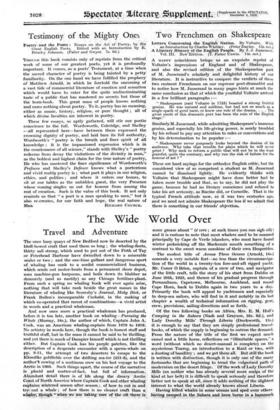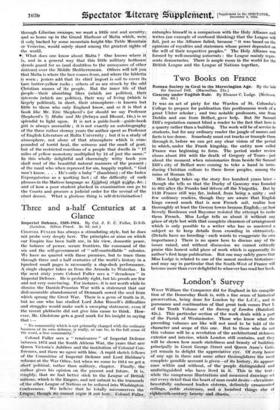The Wide World Over
Travel and Adventure
The once busy quays of New Bedford now lie deserted by the bluff-bowed craft that used them so long ; the whaling-fleets, thirty sail strong, which used to put out of the Firth of Tay or Peterhead Harbour have dwindled down to a miserable sealer or two ; and the one-time gallant and dangerous sport of whaling has sunk to a sordid commercialized business, which sends out motor-boats from a permanent shore depot, uses machine-gun harpoons, and boils down its blubber as demurely (and as nastily) as any Chicago fertilizer-plant. From such a spring no whaling book will ever again arise, nothing that will take rank beside the great names in the literature of whaling like Scoresby's Journal, 211olnj Dick, or Frank Bullen's incomparable Cachalot, in the making of which co-operated that rarest of combinations—a vivid artist in words and a practical whaleman.
And now once more a practical whaleman has produced, before it is too late, another book on whaling—Pursuing the Whale (Murray, 18s.), the author of which, Captain John A. Cook, was an American whaling-captain from 1879 to 1916. No artistry in words here, though the book is honest stuff and truthful stuff, but in the mass it cannot be said to be thrilling, and yet there is much of Dampier himself which is not thrilling either. But Captain Cook has his purple patches, like the description of a desperate encounter with a sperm-whale on pp. 9-11, the attempt of two deserters to escape to the Klondike goldfields over the drifting sea-ice (251-3), and the authorl cowing of a mutinous crew on his last voyage to the Arctic in 1903. Such things apart, the course of the narrative is placid and matter-of-fact, but full of information. Abundant -detail there is of life along the dreary Arctic Coast of North America ivhere Captain Cook and other whaling captains_ wintered season after season,: of how to cut in and try- out a whale ; of how there is no cleaner craft than a wls er; though "when we are 'taking `care of the.oil there is some grease about " (i veto ; at such times you can sigh oil) ; and it is curious to note that most whalers used to be manned principally by Cape de Verde islanders, who must have found winter picknicking off the Mackenzie mouth something of a contrast to the sweet warm sunshine of their own Hesperides.
The modest title of Across Three Oceans (Arnold, 16s.) conceals a very notable feat—no less than the circumnaviga- tion of the world in a twenty-ton fore-and-aft rigged yacht. Mr. Conor 0 Brien, captain of a crew of two, and navigator of the little craft, tells the story of his start from Dublin on June 20th, 1923, and thence of his gradual progress through Pernambuco, Capetown, Melbourne, Auckland, and round Cape Horn, back to Dublin again in two years to a day. Primarily the book will appeal to yachtsmen and especially to deep-sea sailors, who will find in it and notably in its last chapter a wealth of technical information on rigging, gear,
crew, provisions, sailing-directions and so forth. .
Of the two following books on Africa, Mrs. E. M. Hull's Camping in the Sahara (Nash and Grayson, 10s. 6d.), and Lady Dorothy Mills' - Through Liberia (Duckworth, 15s.) it is enough to say that they are simply professional travel- books, of which the supply is beginning to outrun the demand. From the nature of the title of the first we expect much camel and a little horse, reflections on "illimitable spaces," a word (without which no desert-manual is complete)- on the Mysterious Tuareg, an introduction to a Kaid or two, with a dusting of banditry ; and we get them all. But still the book is written with distinction, though it is only one of the many footmarks that are beginning to tread the vulgarized path of modernism on the desert fringe. Of the work of Lady Dorothy Mills (an author who has already several more scalps of the kind at her belt) it is difficult to speak seriously and therefore better not to speak at all, since it adds nothing of the slightest interest to what the world already knows about Liberia.
Having killed whales in some oceans and sped over others having camped in the. Sahara and been borne in a hammock
through Liberian swamps;-we want a little rest and security,- and so home up in the Grand HarboUr of Malta which, were,. it only_ backed by some mountain height -like -Table Mountain Veiluvius, would surely stand among the greatest Sights of the world.
ay; 'What does one know about Malta ? One knows where it is, and in a general way that this little Military hothouse stands guard for us (and doubtless to the annoyance of other nations) over the Middle Mediterranean. Others will tell you that Malta is where the lace comes from, and where the faldetta is worn ; jesters add that its chief import is soil to cover its, bare butter-yellow rocks ; others of us are struck by the odd pKristian names of its peOple. But the inner life of that eople—their absdrbing likes (which are politics), their ipterests (which are politics), their way of living (whichis litrgely political), in short, their atmosphere—is known but little to those who only England know, and so it is that a book like Mr. Eric Shepherd's (or should we my Professor Shepherd's ?) Malta and Me (Selwyn and Blount, 18s.) is so splendid to light upon. It is not a guide-book—guide-book grit is always accessible ; it is not exactly an autobiography df the three rather stormy years the author spent as Professor Of English Literature at Malta University ; but it is a study of atmosphere, not alone of that atmosphere which is corn-' pounded of torrid heat, the scirocco and the smell of goat, but of the restricted reactions of a people that dwells in "i17 miles of yellow monotony multiplied by 12 of just the same."
this wholly delightful and' charmingly witty book you shall read of the beautiful natural manners of the peasant ; of the Maid who when reproved for sin, happily replied, " God won't know. . . . He's only a baby " (bambino) ; of the IndeX Expurgatorius as a working fact ; of the difficulty of such' phrases in the Maltese language as ijjjghaij xlijgh'qzjghp, &C. and of how a poor student plucked in examination can go to the Courts and procure a judicial order for the revisal Of the duel decree. What a glorious thing is 'self-deteHnination !































































 Previous page
Previous page